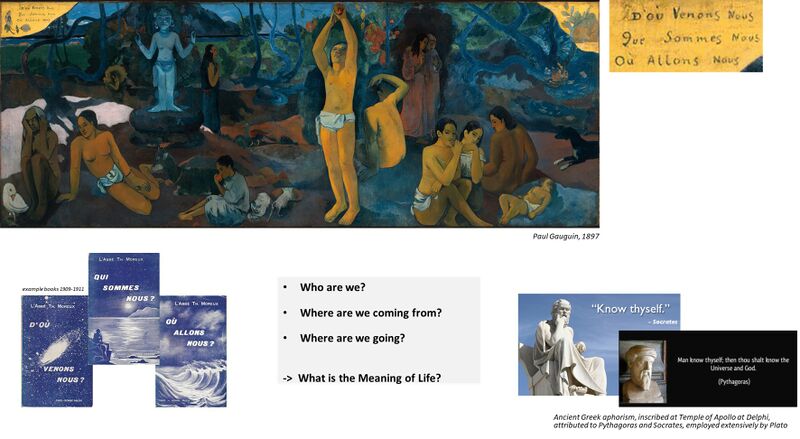Man's most important questions
The most fundamental questions that Man has asked since ages, and that remain eternally valid, are:
- Who are we? ... Who am I? ('Man know thyself!')
- Where do we come from?
- Where are we going?
- What is the Meaning of life?
These questions are also the meaning that a Worldview has to give to existence, and allow individuals and society as a whole to give meaning to their life and activities. It is therefore this quest for teleology, an explanation in terms of purpose (rather than just a description of the facts), that is underlying a worldview, and this is were we distinguish major differences between the worldviews built on Mineral science and Spiritual science.
The importance lies in the fact that there are moral implications for Man and society in his and their orientation and the decisions and choices made. If we live only once, and we are just a speck of dust in the wide universe, than why bother and who cares. If we, humanity, are the crown and purpose of creation and each of our individual thoughts and actions has an impact on the future worlds, in which we ourselves will come back in future lives, together with our children and all our beloved, than obviously we are in a different situation. We should act responsible and caring.
Aspects
- for cosmogony (creation model of cosmos) and teleology (purpose), see: Meaning of life#Note 1 - Relevant concepts and terminology
Inspirational quotes
1903-11-16-GA090A
Humanity looks for the logical reasons, law or trigger for what caused creation, re teleology and cosmogony. This is studied in spiritual science, but there is one important element to be considered, see below. For full quote see: IAO#1903-11-16-GA090A
We cannot investigate the reason for God's devotion .. it is an act of freedom ... the highest act of freedom of the Creator is this gratuitous devotion to the world out of love. There is no compulsion .. there is no "logical" reason (for us within the great spirit).
Illustrations
Schema FMC00.037 illustrates Man's most important questions in the conscious quest for the meaning of life.

Lecture coverage and references
1915-06-03-GA162
for long extract see: Transition between Earth and Future Jupiter#1915-06-03-GA162
All problems of a conception of the Cosmos — whether that of spiritual science or any other — contain this basic query:
What is the evolutionary path of Man within the Cosmos?
One, who has not yet had his thoughts educated through spiritual science, may also ask: What is the ultimate aim of human evolution!
He would like to know what will happen to man when arrived at the end of all evolution! We have often indicated how a question such as this can only come from uneducated thought, and that, for the mind cultured through spiritual science, the aim is to find the way, to perceive rightly any particular point in evolution; for when we know the path evolution has taken, we certainly take a good step forward.
So, let us once again consider, from a certain view-point, the above query: the query of the direction of the evolutionary way.
Discussion
Related pages
- Philosophy
- Worldview
- Meaning of life
- Evolution
- Meaning of Free Man Creator
- There's a crack in everything
Further reading and references
- Théophile Moreux (1867-1954) series of four books
- D'où venons nous ? (1909), Qui sommes-nous ? (1910), Où sommes-nous ? (1911), Où allons-nous? (1911)
- in NL Van waar komen wij? Wie zijn wij? Waar zijn wij? Waar gaan wij heen?,
- Hans C. Moolenburgh: 'Wie zijn wij. Waar komen we vandaan. Waar gaan we naartoe' (2017)
